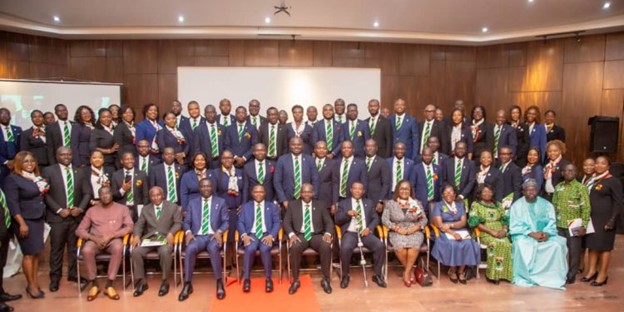“From today, commit yourselves to ethical behaviour and practices so that your institutions and your careers will not suffer the consequences. Starting today, you are a ‘new creation …. all things must become new’ Victor Asante, MD/CEO of First Bank
Today’s article features some golden nuggets shared by Mr. Victor Asante, MD/CEO of First Bank, on the occasion of the 30th induction ceremony at the Chartered Institute of Bankers on July 13, 2024. As always, I felt a sense of pride as I also reminisced on my own graduation a couple of decades ago. Wow! How time flies!
At the program, credit went to the youngest graduand who was twenty-three years, as well as the oldest, who was fifty-three years. It all went to prove that life- long learning is part of the current journey in all spheres of one’s career and we should never lose hope. Can you imagine that I started my professional course after I had four children? You can guess the stress. It is not always common that you have senior executives share their experiences with upcoming professionals.
Mr Asante shared in their relief and happiness to the end of their academic and professional journey. These golden nuggets are very relevant, and I feel that all young professionals should know that leadership does not come on a silver plate, but by dint of hard work from the ground. I have included some extracts from his speech.
The banking crises and its effects on the banking industry
- “About a decade ago, Bankers suffered all sorts of challenges globally. This was around the time of the global financial crisis. It was then not exciting to be a banker. Bankers got negative headlines and I still remember one very well…. “Banksters”
- In recent times, we here in Ghana, have experienced our own banking crisis. What was referred to as the financial sector clean-up. The issues and stories that were bandied about did not make several bankers very proud”.
Research has shown that financial crises over the last 30 years were due to the following:
- poor regulatory oversight,
- poor credit practices,
- dishonest accounting,
- speculative activity,
- poor corporate governance,
- poor risk management,
- conflicts of interest and a sense of infallibility.
He reiterated some of the reasons given by Bank of Ghana for the banking sector clean up were:
- poor credit management practices,
- poor risk management,
- undercapitalization,
- high non-performing loans,
- regulatory gaps and questionable licensing procedures
- poor corporate governance.
Mr Asante summed up all the above identified issues under the theme of the days’ ceremony – ethics, sustainability and professionalism. As an important milestone for the inductees (some of whom aspire to be bankers and some of whom are practicing bankers) as they joined the ranks of professional bankers committed to upholding the highest standards of ethics, sustainability, and professionalism in our industry.
His Personal Story -The Pillars that make any individual a great banking professional
Mr Asante shared his personal story on how to strive to strengthen the practice of banking in Ghana.
- His career began almost three decades ago, in 1996, with Unilever Ghana Limited, as a sales and marketing professional. This role laid a solid foundation for him in customer relations and business strategy.
- His transition into banking in 1998, by joining Merchant Bank, now Universal Merchant Bank, where he worked in various capacities, including marketing, sales, corporate relations, and corporate and relationship banking.
- His career progression: He moved to the Standard Chartered Bank Group, serving in various roles, including, Head of Structured Trade Finance, Regional Head of Transaction Banking for West Africa and eventually as Managing Director and Head of Corporate and Institutional Clients in Botswana .
- He later moved on to become the Head of Corporate, Commercial and Institutional Banking at First National Bank Ghana, a subsidiary of the First Rand Group of South Africa.
- Currently, he serves as the Managing Director and CEO of FirstBank Ghana, which is part of the FirstBank Group.
This Banking journey through Ghana, UK, Botswana and coverage of West Africa has allowed him to drive innovation and excellence in banking while serving our customers and community.
The Story of Ethics in banking- The most fundamental Golden Nugget
- The most worrying and a big culprit in the causes of the financial crisis for his him is ethics. Ethics is the cornerstone of the profession. It builds trust and credibility, which are essential for long-term success.
- One’s career has been guided by a commitment to integrity and transparency, which foster trust with colleagues, clients, partners, and the broader community. And at the centre of this has always been ethics.
- As a Rotarian, Mr Asantes’s believes strongly in the core pillar of Rotary, which is ethics and which also reflects in the 4-way test of the things we think, say or do:
- Is it the truth?
- Is it fair to all concerned?
- Will it bring goodwill and better friendships?
- Will it be beneficial to all concerned?
- Respect and fairness are also crucial. Treating clients, colleagues, and stakeholders with respect and fairness is essential. This means providing equal opportunities, avoiding discrimination, and ensuring that all dealings are above board, in compliance with regulations and policies, and are just and unbiased.
- In the financial sector, ethical conduct is non-negotiable.
- The financial sector clean-up in Ghana, which saw nine indigenous banks losing their licenses and nearly four hundred other financial institutions collapsing, highlights the importance of ethical behaviour.
Advocation for a Training manual for Bankers:
Four years ago, at the Opoku Ware Old Boys Association’s Burgess Kalinauckas Adu-Amankwaah Memorial Lectures on the topic: ‘’Preventing the next financial crisis – getting it right with training, education and apprenticeship,’’, Mr Asante advocated for Bank of Ghana and other institutions, must document these events for use as a training manual for bankers.
This will be like the special investigations commission report in Iceland following their 2008 banking crisis, and that would be invaluable. He said that professional bodies like the Institute of Chartered Accountants, Ghana (ICAG), the Institute of Internal Auditors, Ghana (IIAG) apart from our own Chartered Institute of Bankers CIB) should be interested in this training manual.
Such a document should detail the causes, consequences, lessons, and way forward and be integrated into the curriculum of educational institutions teaching banking and finance.
After the Ghana Banking sector clean up, the industry is no longer at ease, maybe this time due more to the external factors than internal factors. But whatever be the case, we must always properly document what the causes are, so we can have a constant reference.
Sustainability as a necessity
As new members of the Chartered Institute of Bankers, he stressed that sustainability is not just an option but a necessity.
- Sustainability is about ensuring that our banking practices contribute positively to the lives and livelihood of people, the planet and profit, all of which bode well for the economy.
- Sustainability is about ensuring that our actions today do not compromise the ability of future generations to meet their needs.
He reminded them that as they embark on, or continue with their professional journey, they should remember that their commitment to sustainability will drive innovation, customer loyalty, and financial stability.
The Need for Professionalism
- Professionalism involves maintaining high standards of competence and conduct. It encompasses integrity, competence, accountability, and a commitment to continuous improvement.
- Stay informed about industry trends, regulatory changes, and new financial instruments.
- They were also asked to seek opportunities for further education and certification, and by doing so, you not only enhance your own capabilities but also contribute to the growth and stability of the banking sector.
- Striving for excellence is also a must in their effort to continually seek ways to improve. Excellence is therefore not a destination but a journey, and it requires deliberate, and relentless dedication.
Final Remarks
Hs closing remarks to the newly inducted members, especially to the new ones now starting their banking careers, was to uphold the highest standards of ethics, strive for sustainability in all their endeavours, and maintain professionalism in every aspect of their work. He said to them “Together, let us build a banking industry that is trusted, resilient, and dedicated to the betterment of society. Let us move forward with a commitment to excellence and a shared vision for a better future. Thank you for the opportunity to share my journey and insights. I wish you all success in your careers and endeavours and I look forward to hearing about the great strides you make in the industry”.
Thanks, Mr Victor Asante for your encouragement. Congrats to all our inductees and enjoy your banking career.
ABOUT THE AUTHOR
Alberta Quarcoopome is a Fellow of the Institute of Bankers, and CEO of ALKAN Business Consult Ltd. She is the Author of Three books: “The 21st Century Bank Teller: A Strategic Partner” and “My Front Desk Experience: A Young Banker’s Story” and “The Modern Branch Manager’s Companion”. She uses her experience and practical case studies, training young bankers in operational risk management, sales, customer service, banking operations and fraud.
CONTACT
Website www.alkanbiz.com
Email:alberta@alkanbiz.com or [email protected]
Tel: +233-0244333051/+233-0244611343










